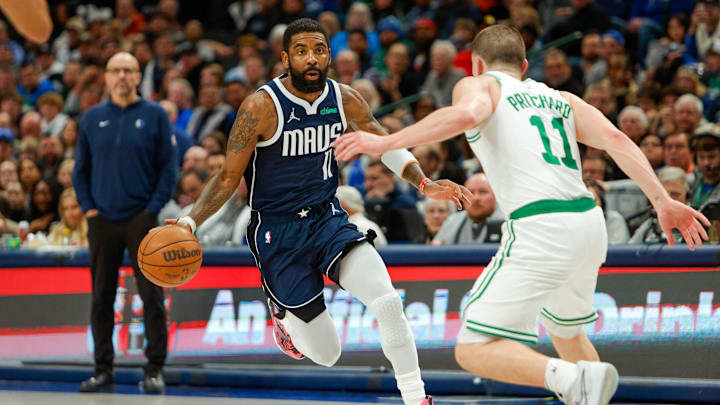The story of how Kyrie Irving came to be a member of the Boston Celtics has always seemed like a bit of a strange one. After spending the first six seasons of his career with the Cleveland Cavaliers and after three straight runs to the NBA Finals alongside LeBron James, it seemed Irving would be sporting the wine and gold for the entire duration of his professional career.
But then in the summer of 2017, something truly unusual happened: Kyrie requested a trade out of Cleveland. Three weeks into July that year, the news broke that he was unhappy and wanted a change of scenery in a place where he could be more of a focal point. To the surprise of everyone, he failed to inform LeBron of his wishes before the request was made public.
One month and one day later, Irving was officially dealt to the Celtics in exchange for Isaiah Thomas, Jae Crowder, Ante Zizic, and a first-round pick. The situation was dealt with quickly, and both Boston and Cleveland had time to figure out their rosters before the season began. They would meet in the Eastern Conference Finals the next season, with the Cavs winning in seven games.
All this happened so quickly, it can be easy to let some of the important details get lost to time. Yahoo Sports Senior NBA Reporter Jake Fischer recently revealed that at the time, Kyrie had a list of preferred landing spots that he explicitly gave to Cavaliers management. They were the San Antonio Spurs, New York Knicks, Minnesota Timberwolves, and Miami Heat.
Kyrie reportedly did not want to join the Celtics
According to Fischer, Irving's list intentionally did not include Boston, a fact that is sure to enrage Celtics fans and possibly make them see him as an even bigger villain than they already do. The reasoning behind this was that Kyrie did not want to go to the team he had just faced in the 2017 Eastern Conference Finals.
This is an interesting mindset, considering the Cavs won that series in five games. It would be one thing if Irving, in the spirit of being a competitor, did not want to join a team that had just beaten him in the playoffs. But instead, he was apparently adamant about avoiding joining a team that he and his soon-to-be former team had just taken down.
These circumstances lead one to wonder if there was any alternative motives behind Kyrie's intentionality in leaving the Celtics off his list. We will never know for sure, but it is hard to imagine this report softening the feelings of any fans in Boston toward their former starting point guard.
The story also makes Kyrie's departure just two seasons later seem more sensical. If he never truly wanted to be there in the first place, it would seem logical that he would leave at the first big contract offer, regardless of how much he may have grown to like the city.
